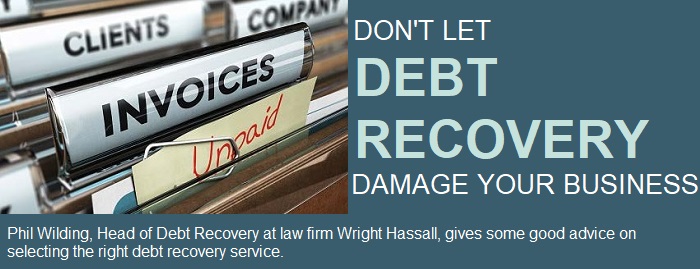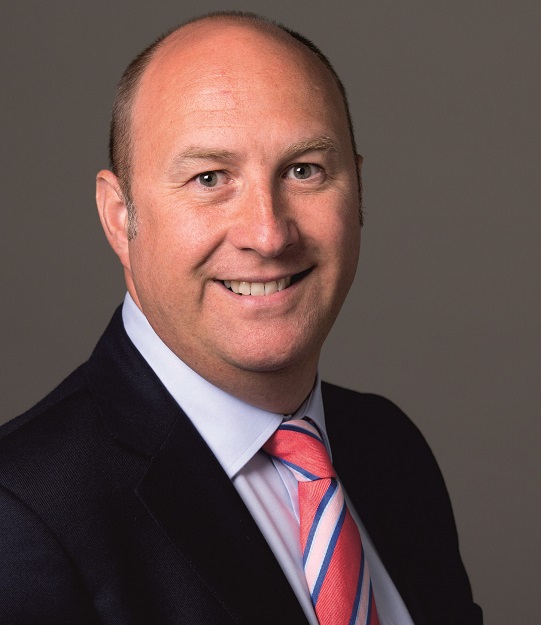Phil Wilding, Head of Debt Recovery at law firm Wright Hassall, gives some good advice on selecting the right debt recovery service.

Recently, the Small Business Commissioner has been given stronger powers in the hope that the culture of late payments will improve. However, there will undoubtedly be some SMEs that fail due to the resultant cash-flow issues.
For some businesses, it can be difficult to chase unpaid invoices, as they lack the resources needed to pursue parties relentlessly. In these cases, it can be better to seek professional help by recruiting the help of an experienced debt recovery partner.
If the debts are under £10,000 then acting through the small claims process is advisable, but if it goes over that amount, then it’s better to seek professional help.
The different debt collection services
If your efforts to recover unpaid debts have failed, then it’s time to find a debt recovery agency (DRA) with a proven track record.
When researching the available options, it’s important to find a service provider that offers an end to end debt recovery solution, from pre-legal through litigation to enforcement. This allows the level of activity or tone of recovery message to be escalated, ensuring more money is collected.
The location of the firm should be one of your biggest considerations, as London-based DRAs are likely to charge more than those based elsewhere.
Firms will often specialise in the types of debts they recover, whether it’s loans, rent arrears, unpaid invoices, etc., which ensures they understand the situation more quickly and apply tactics learned through experience of addressing similar challenges.
Understanding the likely costs
When choosing a business to work with, it’s always best to avoid those offering a ‘one-size-fits-all’ solution, as they will rarely offer flexible pricing or a bespoke solution.
When the cost for the first letter or call is very low, it tends to indicate a system grounded on bulk processing, rather than a service tailored to each debt. Before instructing the DRA to act for you, ensure you have a quote for the cost of recovery.
Any reputable DRA must outline their commission rates during the engagement process; there’s little point chasing debts unless you are guaranteed to receive most of any recovered monies.
Look for a DRA regulated by the Financial Conduct Authority (FCA), which offers you protection if they fail to act in an appropriate manner, and for a double layer of quality assurance, work with a law firm regulated by the Solicitors Regulation Authority (SRA).
No damage to customer relationships
Pursuing debts is stressful and, if you decide to take action in court, a lot of evidence will need to be gathered, such as copy invoices, contracts and copies of correspondence exchanged between the parties, all of which you have to do while continuing to run your business.
It is also worth remembering your customers are likely to discuss you, and any weakness or mistakes you make while pursuing debts could see more of your customers willing to test your patience over unpaid invoices.
Outsourced debt recovery can help protect client relationships, with law firms experienced in handling all communication with clients, who will understand it’s just the way you protect your business.
Law firms have the necessary teeth if the action needs to be escalated. However, they also understand the commercial realities of the supplier/customer relationship and will offer pragmatic advice over which debts are worth pursing and which are not, in consideration of all the relevant circumstances.
Court is a last resort
Before taking court action, it’s important that you make every effort to settle disputes between the parties involved, as this would be a more cost-effective route. Only once these options have been exhausted should you seek legal advice, as this is now beyond the scope of the DRA.
Choosing to go through the courts should only be considered if the customer refuses to pay the debt, despite having the financial support to cover it. Pursuing clients who don’t have the money can be a pointless exercise, unless it’s for personal satisfaction.

Finally, remember that choosing the right debt collection agency could well affect the ultimate success of your money being recovered. Then consider engaging the firm on a regular basis to act as your outsourced credit control department to ensure a seamless service that also takes the pressure off your in-house team.
Phil Wilding
Phil is Head of Debt Recovery at law firm Wright Hassall, specialises in volume debt recovery including asset finance recoveries, book debt collect-outs, and consumer and commercial debt recovery.
Photo: Phil Wilding, Wright Hassall